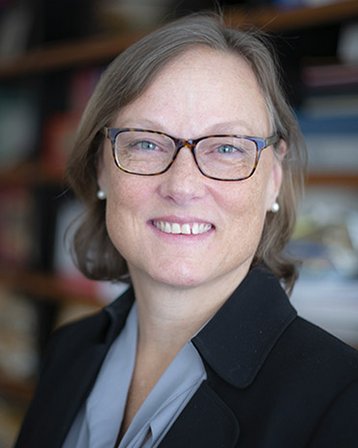Amanda Bayer
Franklin E. and Betty Barr Chair in Economics
On Leave - Academic Year
Economics
Contact

Curriculum Vitae / Wikipedia / Bio / Selected publications and projects / Teaching
Amanda Bayer is Franklin and Betty Barr Professor of Economics at Swarthmore College, where she teaches introduction to microeconomics and macroeconomics, advanced microeconomic theory, game theory, and race, ethnicity and gender in economics. She holds a B.A. in economics and psychology from Williams College and an M.Phil. and Ph.D. in economics from Yale University.
Professor Bayer's scholarship explores diversity, inclusion, and innovation in economic education and research. She is a member of the AEA Executive Committee and serves on the AEA's Advisory Committee on Editorial Appointments, Committee on Equity, Diversity, and Professional Conduct, and Committee on the Status of Minority Groups in the Economics Profession. As detailed in her curriculum vitae, she advises at the Federal Reserve Board and other organizations, including the National Academy of Sciences, the Social Science Research Council, and the College Board. She leads the AEA's work on Best Practices for Economists and is the co-organizer of several conferences hosted by the Board of Governors of the Federal Reserve System, including Disparities in the Labor Market: What Are We Missing?, Gender and Career Progression (joint with the BOE and ECB), and the National Summit on Diversity in the Economics Profession in 2014, at which Federal Reserve Chair Janet L. Yellen delivered the opening remarks. Professor Bayer is the creator and editor of Diversifying Economic Quality, a widely read online resource supported by the AEA, which promotes inclusive, innovative, and evidence-based teaching practices in economics. The project helps economists to engage students with diverse backgrounds and learning styles and to recalibrate their teaching and research with new insights on race, class, gender, culture, discrimination, and inequality.
In other research projects, Professor Bayer has investigated the effects of youth mentoring programs using econometric analysis and has evaluated randomized controlled trial and quasi-experimental studies of education interventions for the U.S. Department of Education. Using her expertise in game theory, Professor Bayer has researched the effects of strategic behavior in settings such as litigation, labor negotiations, managerial decision making, and neighborhood development. She has partnered with a variety of nonprofit organizations to investigate topics of mutual interest and has led major projects for the College's Peace and Conflict Studies and Athletics programs.
Selected publications and projects:
- Diversifying Economic Quality, first published in 2011 with a major update in summer 2021. (Videos on economists and their research)
- Diversity in the Economics Profession: A New Attack on an Old Problem, with Cecilia E. Rouse, Journal of Economic Perspectives 30(4), 2016.
- How You Can Work to Increase the Presence and Improve the Experience of Black, Latinx and Native American People in the Economics Profession, with Gary A. Hoover and Ebonya Washington, Journal of Economic Perspectives 34(3), 2020.
- Does Simple Information Provision Lead to More Diverse Classrooms?, with Syon Bhanot and Fernando Lozano, AEA Papers and Proceedings 109, 2019.
- Expanding and Diversifying the Pool of Undergraduates who Study Economics: Insights from a New Introductory Course at Harvard, with Gregory Bruich, Raj Chetty, and Andrew Housiaux,The Journal of Economic Education 51(3-4), 2020. (NBER Working Paper)
- AEA Best Practices for Economists: Building a More Diverse, Inclusive, and Productive Profession, with Şebnem Kalemli-Özcan, Rohini Pande, Cecilia Elena Rouse, Anthony A. Smith, Jr., Juan Carlos Suárez Serrato, and David W. Wilcox, American Economic Association, 2019.
- AEA Professional Climate Survey, with Sam Allgood, Lee Badgett, Marianne Bertrand, Sandra E. Black, Nick Bloom and Lisa D. Cook, American Economic Association, 2019; (Professional) Climate Change, The Minority Report, 2020.
- Who is Being Trained in Economics? interactive; The Unequal Distribution of Economic Education, with David Wilcox, Journal of Economic Education 50(30), 2019. (FEDS paper & pdf)
- Diagnosing the Learning Environment for Diverse Students in Introductory Economics: An Analysis of Relevance, Belonging, and Growth Mindsets, with Syon Bhanot, Erin Bronchetti, and Stephen A. O'Connell, AEA Papers and Proceedings 110, 2020.
- Defining and measuring learning: chapter, book, Learning Outcomes for Economists, with Sam Allgood, American Economic Review 107(5), 2017; PLATO
- CSWEP/CSMGEP Recruiting and Mentoring Diverse Economists, CSWEP News, 2017; The Economics Profession's Unique Problem with Diversity, The Minority Report, 2018.
- Enhancing Inclusivity in Economics at Liberal Arts Colleges
Teaching:
- ECON 001. Introduction to Economics
- ECON 012. Game Theory and Strategic Behavior
- ECON 073. Race, Ethnicity, and Gender in Economics
- ECON 101. Advanced Microeconomics
Download a Hi-res Photo



